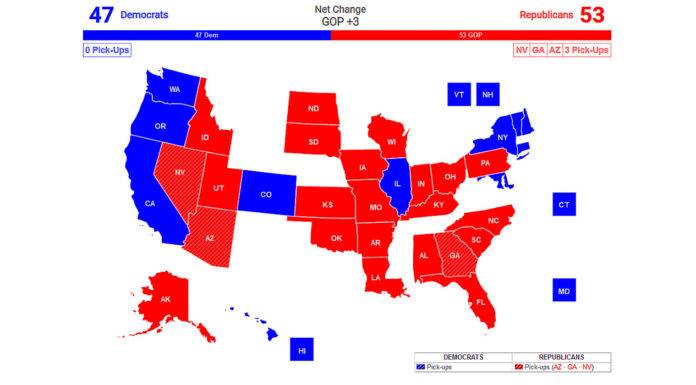(Ben Sellers, Headline USA) In another telling indication that Republicans have all the momentum heading into the Nov. 8 midterm, leading election prognosticator RealClearPolitics now projects three Republican pickups in the evenly-split U.S. Senate.
Its predictions—barring any game-changing October surprises or ballot-box malfeasance—see Republicans holding the seats of retiring Sens. Rob Portman, R-Ohio, and Pat Toomey, R-Pa., in two of the more tightly contested races by electing Republicans JD Vance and Mehmet Oz, respectively.
Moreover, they show Republicans reclaiming two seats lost in 2020 special elections: the Georgia seat in which football great Herschel Walker is challenging incumbent Democrat Raphael Warnock, and the Arizona seat that has seen a last-minute surge from venture capitalist Blake Masters against incumbent Mark Kelly.
Masters’s dominant performance in a recent debate—and a subsequent agreement between billionaire Peter Thiel and Senate minority leader Mitch McConnell, R-Ky., to invest millions more dollars in the race—may have helped compel RCP to add him into the win column, despite Masters having long trailed the deep-pocketed Kelly in polls.
RCP also projects that former Nevada Attorney General Adam Laxalt will comfortably oust sitting Sen. Catherine Cortez Masto in a state where former Senate Majority Leader Harry Reid’s corrupt Democrat political machine has long dominated.
While RCP’s polling averages in Pennsylvania, Arizona and Georgia all show the Democrats with a marginal lead of around 2.5 percentage points, its projections take into account the polling biases of past elections—notably the 2016 and 2020 races, in which Republicans were drastically underestimated.
The adjusted numbers still put Warnock and Walker close in Georgia, which may result in a Dec. 6 run-off election where the two would face each other without libertarian candidate Chase Oliver poaching a portion of Walker’s likely voters.
Meanwhile, RCP’s projections for the House show 221 seats already secured by the GOP, which would give the gavel back to Republican leader Kevin McCarthy (or perhaps a more conservative challenger for the speakership) with a margin of seven seats even in the unlikely event that Democrats were to claim all of the 38 remaining tossups.
The upper end of that projection—259 total seats—would put Republicans only 31 seats away from the two-thirds majority needed to override a presidential veto, adding considerable pressure on Democrats to abandon their radical brinksmanship of the past four years since regaining control in the 2018 midterms.
But if history is any indication, the GOP could stand to gain even more. In the 2010 midterm election, in which Republicans entered the race with 179 seats, they were able to net a total of 63 pickups, starting off the 112th Congress with 242.
With then-President Barack Obama relatively moderate in comparison to the Biden administration, a similar 63-seat shellacking this year would put the GOP at 275 House seats.
While most Democrat senatorial races in non-battleground blue states seem locked in, surprises in Washington state, New Hampshire and even Connecticut could put Mitch McConnell (or a more conservative challenger) only four seats from the 60 needed to override a filibuster (assuming the new GOP majority leader ignores the present calls of Democrats to abolish it altogether).
It would still take 10 Democrats reaching across the aisle to give the GOP Senate enough votes to override a veto or to convict any presiding executive officers impeached by the House.
While paling in comparison to the six gubernatorial pickups in 2010, RCP also favorably projected Republicans to gain two additional governor’s seats, which would give them 30 of the 50 state executive mansions—one more than they had coming out of Obama’s first midterm.
That bodes well for the GOP entering into a 2024 election season that might see a more favorable political map regardless of the presidential nominees, but particularly if the Biden administration continues on its current trajectory while disregarding a clear popular mandate to pivot toward the center.
The two most notable gubernatorial flips are projected in Oregon, a deep-blue state where voters may look to punish radical leftist for allowing months of riots and other extreme policies to take root; and Wisconsin, a key battleground state where Democrat Gov. Tony Evers’s COVID mandates and soft-on-crime policies may be fresh on voters’ minds.
Democrats, meanwhile, are likely to claim seat-flipping gubernatorial victories in Massachusetts and Maryland, two deep-blue states led by RINOs who did little to advance the GOP’s overall objectives and much to undermine them during the Trump administration.
Ben Sellers is the editor of Headline USA. Follow him at truthsocial.com/@bensellers.

